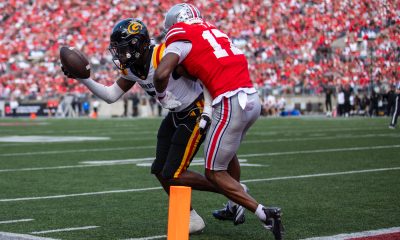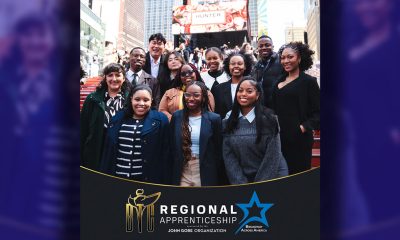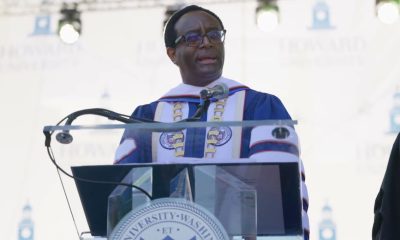Religion
Anti-Gay Protest Backfires at Howard University

A group of students pose for a picture during a counterprotest against Westboro Baptist Church members (not shown) on the campus of Howard University. Church members were on campus protesting Howard University School of Law’s organization for lesbians, gays, bisexuals, and transgender and queer students. (Shenarri Freeman/HUNS)
By Rachel Kersey
Special to NNPA from Howard University News Service
WASHINGTON – Westboro Baptist Church, the infamous unaffiliated church known for its hateful, unorthodox protests, especially against homosexuality, brought its hate speech to Howard University – and the university’s students and staff fought back.
Armed with picket signs, the organization, which has been denounced by the two largest Baptist denominations, Friday, April 10, gathered on 6th Street on Howard’s campus to denounce OUTlaw, Howard University School of Law’s organization for lesbians, gays, bisexuals, and transgender and queer students.
“AMERICA IS DOOMED,” “MOURN FOR YOUR SINS” and “GOD H8S FAG MARRIAGE,” the signs read. One sign featured a depiction of anal sex.
“It is a shameful sight to see the way that these young people behave, and the parents teachers and preachers have done that to them,” the church said on its website in explaining why it came to Howard. “They have no chance when they stand before the Great White throne on Judgment Day. We come in hopes that one little lamb is out there and may be called to repentance by the Lord their God.”
Howard students met the signs with their own. Dressed in all-black or rainbow colors, the students held signs that read “HOWARD <3s OUR LGBTQ,” “ALL BLACK LOVE MATTERS” and “GOD LOVES EVERYONE.”
Nearly 100 students gathered at the flagpole and marched to the corner of 6th Street and Howard Place, where they promptly turned their backs on Westboro.
With fists raised in defiance, the sea of students sang “Lift Every Voice and Sing,” and more than one student shed a few tears. Only 20 minutes after starting, Westboro headed down the hill to the taunts of Howard students, who turned around to send them on their way.
“I thought it was perfect,” said Nia Johnson, a junior economics major. “I definitely felt the love and I felt proud. I was actually happy it ended early. Our power showed them that it wasn’t worth it here.”
Amber Mason, president of OUTlaw, agreed.
“This sort of hate filled rhetoric is not condoned on our campus, and we want to show them that through a show of solidarity,” Mason said.
“That’s now how we think here at Howard. We are inclusive, we’re accepting and their kind of speaking and behavior will not be condoned.”
Lydia Durfler, the organizer of the student protest, said she did so because LGBT community at Howard is often slighted.
“I don’t think it gets enough outright support from the Howard community, especially where the administration and faculty is concerned,” said Durfler, a senior political science major and an Amnesty International intern.
“And if we had a group on campus saying derogatory things about black folk and we weren’t doing something to build ourselves up in the midst of that, that would seem pretty crazy. The same goes for the LGBTQ community.”
Joshua Narcisse, president of the Chapel Assistants, an interfaith organization with Howard’s Andrew Rankin Memorial Chapel, said his organization stands against Westboro Baptist Church.
“One of the dominant themes in Christianity is love,” Narcisse said. “So, at the end of the day, whether it be Christianity, Islam, Hinduism or Buddhism, this love or respect for humanity is at the center of the work that the chapel does. And this is really just a part of us affirming that.”
Tyleah Hawkins, a senior broadcast journalism major, also objected to Westboro’s belief and its tactics.
“I’m a Christian, but I’ve always been an advocate for gay rights,” Hawkins said. “I don’t agree with preaching hate. I am a proud Christian. I love Jesus . . . and I feel like Jesus would be out here protesting with me.”
In the end, the protest – both sides – was one chapter of the rich social and political saga of the university, and there is undoubtedly more to follow,” said the Rev. Bernard Richardson, dean of the Andrew Rankin Memorial Chapel.
“This is Howard University,” Richardson said. “Protests and all the other things are what happen here at Howard. It’s part of our legacy. It’s part of our history.”
Activism
OP-ED: AB 1349 Puts Corporate Power Over Community
Since Ticketmaster and Live Nation merged in 2010, ticket prices have jumped more than 150 percent. Activities that once fit a family’s budget now take significant disposable income that most working families simply don’t have. The problem is compounded by a system that has tilted access toward the wealthy and white-collar workers. If you have a fancy credit card, you get “presale access,” and if you work in an office instead of a warehouse, you might be able to wait in an online queue to buy a ticket. Access now means privilege.

By Bishop Joseph Simmons, Senior Pastor, Greater St. Paul Baptist Church, Oakland
As a pastor, I believe in the power that a sense of community can have on improving people’s lives. Live events are one of the few places where people from different backgrounds and ages can share the same space and experience – where construction workers sit next to lawyers at a concert, and teenagers enjoy a basketball game with their grandparents. Yet, over the past decade, I’ve witnessed these experiences – the concerts, games, and cultural events where we gather – become increasingly unaffordable, and it is a shame.
These moments of connection matter as they form part of the fabric that holds communities together. But that fabric is fraying because of Ticketmaster/Live Nation’s unchecked control over access to live events. Unfortunately, AB 1349 would only further entrench their corporate power over our spaces.
Since Ticketmaster and Live Nation merged in 2010, ticket prices have jumped more than 150 percent. Activities that once fit a family’s budget now take significant disposable income that most working families simply don’t have. The problem is compounded by a system that has tilted access toward the wealthy and white-collar workers. If you have a fancy credit card, you get “presale access,” and if you work in an office instead of a warehouse, you might be able to wait in an online queue to buy a ticket. Access now means privilege.
Power over live events is concentrated in a single corporate entity, and this regime operates without transparency or accountability – much like a dictator. Ticketmaster controls 80 percent of first-sale tickets and nearly a third of resale tickets, but they still want more. More power, more control for Ticketmaster means higher prices and less access for consumers. It’s the agenda they are pushing nationally, with the help of former Trump political operatives, who are quietly trying to undo the antitrust lawsuit launched against Ticketmaster/Live Nation under President Biden’s DOJ.
That’s why I’m deeply concerned about AB 1349 in its current form. Rather than reining in Ticketmaster’s power, the bill risks strengthening it, aligning with Trump. AB 1349 gives Ticketmaster the ability to control a consumer’s ticket forever by granting Ticketmaster’s regime new powers in state law to prevent consumers from reselling or giving away their tickets. It also creates new pathways for Ticketmaster to discriminate and retaliate against consumers who choose to shop around for the best service and fees on resale platforms that aren’t yet controlled by Ticketmaster. These provisions are anti-consumer and anti-democratic.
California has an opportunity to stand with consumers, to demand transparency, and to restore genuine competition in this industry. But that requires legislation developed with input from the community and faith leaders, not proposals backed by the very company causing the harm.
Will our laws reflect fairness, inclusion, and accountability? Or will we let corporate interests tighten their grip on spaces that should belong to everyone? I, for one, support the former and encourage the California Legislature to reject AB 1349 outright or amend it to remove any provisions that expand Ticketmaster’s control. I also urge community members to contact their representatives and advocate for accessible, inclusive live events for all Californians. Let’s work together to ensure these gathering spaces remain open and welcoming to everyone, regardless of income or background.
Activism
Tribute to Allen Temple Baptist Church Pastor Emeritus Rev. Dr. J. Alfred Smith Sr., 94
Dr. Smith did not set out to become famous; however, he became a renowned, celebrated pastor, preacher, professor, prophet, author, and theologian. He has been honored as one of the top Black preachers of America, earned and received countless awards, and was the recipient of hundreds of honoree acknowledgements that would be a small book in itself.

“I decided early to give my life to something eternal and absolute. Not too little gods…. but to God who is the same yesterday, today, and tomorrow.” J. Alfred Smith Sr.
By Rev. Dr. Martha C. Taylor, Allen Temple Baptist Church Historian
Most tributes are written from the writer’s personal perspective of the deceased. My intent is to expand this tribute so that readers feel a sense of shared experiences and admiration. Pastor Smith had a unique gift of making each person feel as if their relationship with him was deep and personal; making every single one of us feel like the most important person he knew. To that extent this tribute is written as shared experiences and admiration for a man who was exceptional in his ministry, his mission and his life. To pay tribute to this giant of a man is a high privilege and honor.
The Rev. Dr. J. Alfred Smith Sr., lived a life beyond himself. Using his famous quote, “I wish I could make it plain,” my desire is to make this tribute plain so that the reader can feel Dr. Smith’s compassion, wisdom, his love for the other, his faithful service while he traveled the Jericho Road.
His deep faith was a powerful example to others; affirming a shared hope in God as we recall his lasting legacy. We celebrate his life, his love for the other, and a legacy that few will attain.
Alfred Smith was born May 19, 1931, in Kansas City, Missouri. He was raised by his loving mother, Amy Gates Smith, and his grandmother, Mrs. Martha Henry. He obtained his early education in Kansas City and graduated in 1948 from the R. T. Coles High School. That same year, he was licensed to preach, and in 1951 he was ordained at Pilgrim Rest Baptist Church in Kansas City where he served as assistant pastor for three years.
In 1950, Pastor Smith married the love of his life, Joanna Goodwin. To this union, five beautiful children were added to the family bringing even more joy and happiness. Their marriage lasted until she was called home to be with the Lord on Aug. 12, 2007. Later, The Lord blessed Dr. Smith and Rev. Bernestine Farley in marriage. Together they were powerful ministry partners with a blended family. Rev. Bernie, as she is fondly called, is an ordained minister having served at the Allen Temple Arms I and II.
During the 1950s to ’60s, Dr. Smith pastured various small churches in Missouri He also served for three years as principal of Lincoln Elementary School at Keyesville, Missouri, over a period of 20 years. With a heart to excel, and knowing that God wants his leaders properly equipped to serve the people, he burned the midnight oil and enrolled in several colleges and universities and earned four degrees; a Bachelor of Science in elementary education (1952), Bachelor of Divinity (1959), Masters of Theology in Church and Community (1966), Master’s in American Church History (1972), and a Doctor of Ministry (1975).
In 1971, Dr. Smith was elected senior pastor of Allen Temple Baptist Church. He was elected president of the Progressive Baptist State Convention of California in 1979, and president of the Progressive National Baptist Convention in 1986. Smith joined the teaching faculty at the American Baptist Seminary of the West as professor of Christian Ministries in 1992.
The question that arises at this time is what were some of the human qualities, God-given gifts, his dedication to his calling that impacted his ministry locally and beyond? Pastor Smith loved to pray; he knew his power and strength came from a deep prayer life with God. His meetings started with prayer, his phone calls ended in prayer, and amazingly, he often would make phone calls and say, “I was just thinking of you, let’s have a word of prayer.”
Dr. Smith did not set out to become famous; however, he became a renowned, celebrated pastor, preacher, professor, prophet, author, and theologian. He has been honored as one of the top Black preachers of America, earned and received countless awards, and was the recipient of hundreds of honoree acknowledgements that would be a small book in itself.
He addressed the United Nations to oppose South African apartheid and preached in pulpits worldwide, never shying away from controversial issues that represent the marginalized. Dr. Smith had a way of attracting people; he led marches that galvanized communities and people of varying nationalities to the steps of City Hall to speak on issues that plague communities. One of his favorite quotes: “To get to the sweet bye and bye you have to deal with the nasty now and now.” Dr. Smith fuels his passionate, prophetic preaching and praying power from his dependence upon God, which started at his mother’s knee, Amy Gates Smith.
Pastor Smith served everyone – from the lonely to high-ranking officials. Like Jesus, he walked with the marginalized with an open-door policy, all were welcome. The powerful often sought wise counsel from him. Pastor Smith preached and taught all over the universe.
Life has many turns; the Rev. Dr. Jacqueline A. Thompson – Allen Temple’s senior pastor – was licensed and ordained by Dr. Smith; she was his daughter in the ministry who became his pastor. They shared a close relationship.
James Ella James said it like this “He was one of the most important people in my life. He was a real friend, brother, trustworthy and very caring person. It is so hard to describe James Alfred Smith. I don’t know anybody like him.”
I believe we all share James Ella James thoughts and feelings about Dr Smith.
He was never too busy to listen; he had a compassionate heart that comforted others. Most of us know he could shed tears at the drop of a hat. He was a wonderful counselor who offered grace and perspective.
After Sunday morning worship, he always went to the narthex, shook hands, and personally greeted people. He told me when you are greeting the people don’t forget to pat the little children on the head and tell them how much they are growing.
The Rev Dr. Otis Moss Jr said Pastor Smith’s preaching, teaching, and leadership commitments did not take him away from human rights struggles. ‘They take him deeper and deeper into the human rights struggles.”
Perhaps one of the outstanding contributions Pastor Smith made in his ministry was not only housing for seniors and HIV AIDS, but he also ensured that women were ordained and preached in the pulpit and elsewhere.
Among those he ordained early on was Rev. Dr. Ella Mitchell. Women from the four corners of America, there are numerous women who owe Dr. Smith a debt of gratitude for embracing them into the ministry.
When Dr. Smith’s health was challenged with a stroke, crippling him, he then preached from a wheelchair. His last sermon at Allen Temple was on Father’s Day, June 15: “A Good Daddy and his two sons.”
On Sept. 19, 2025, the Lord said, “Well Done, Good and Faithful Servant.”
Dr. Smith’s legacy of faith will live on.
All Services will be held on the Allen Temple Baptist Church Campus and will be livestreamed on Thursday, Oct. 9, 2025, lying in repose from 2 p.m. to 5 p.m., followed by an evening of worship and witness on Friday, Oct. 10, Celebration of Life – 11 a.m.
Activism
Juneteenth: Celebrating Our History, Honoring Our Shared Spaces
It’s been empowering to watch Juneteenth blossom into a widely celebrated holiday, filled with vibrant outdoor events like cookouts, festivals, parades, and more. It’s inspiring to see the community embrace our history—showing up in droves to celebrate freedom, a freedom delayed for some enslaved Americans more than two years after the Emancipation Proclamation was signed.

By Wayne Wilson, Public Affairs Campaign Manager, Caltrans
Juneteenth marks an important moment in our shared history—a time to reflect on the legacy of our ancestors who, even in the face of injustice, chose freedom, unity, and community over fear, anger, and hopelessness. We honor their resilience and the paths they paved so future generations can continue to walk with pride.
It’s been empowering to watch Juneteenth blossom into a widely celebrated holiday, filled with vibrant outdoor events like cookouts, festivals, parades, and more. It’s inspiring to see the community embrace our history—showing up in droves to celebrate freedom, a freedom delayed for some enslaved Americans more than two years after the Emancipation Proclamation was signed.
As we head into the weekend full of festivities and summer celebrations, I want to offer a friendly reminder about who is not invited to the cookout: litter.
At Clean California, we believe the places where we gather—parks, parade routes, street corners, and church lots—should reflect the pride and beauty of the people who fill them. Our mission is to restore and beautify public spaces, transforming areas impacted by trash and neglect into spaces that reflect the strength and spirit of the communities who use them.
Too often, after the music fades and the grills cool, our public spaces are left littered with trash. Just as our ancestors took pride in their communities, we honor their legacy when we clean up after ourselves, teach our children to do the same, and care for our shared spaces.
Small acts can inspire big change. Since 2021, Clean California and its partners have collected and removed over 2.9 million cubic yards of litter. We did this by partnering with local nonprofits and community organizations to organize grassroots cleanup events and beautification projects across California.
Now, we invite all California communities to continue the incredible momentum and take the pledge toward building a cleaner community through our Clean California Community Designation Program. This recognizes cities and neighborhoods committed to long-term cleanliness and civic pride.
This Juneteenth, let’s not only celebrate our history—but also contribute to its legacy. By picking up after ourselves and by leaving no litter behind after celebrations, we have an opportunity to honor our past and shape a cleaner, safer, more vibrant future.
Visit CleanCA.com to learn more about Clean California.
-

 Activism4 weeks ago
Activism4 weeks agoDesmond Gumbs — Visionary Founder, Mentor, and Builder of Opportunity
-

 Activism4 weeks ago
Activism4 weeks agoFamilies Across the U.S. Are Facing an ‘Affordability Crisis,’ Says United Way Bay Area
-

 Alameda County4 weeks ago
Alameda County4 weeks agoOakland Council Expands Citywide Security Cameras Despite Major Opposition
-

 Alameda County4 weeks ago
Alameda County4 weeks agoBling It On: Holiday Lights Brighten Dark Nights All Around the Bay
-

 Activism4 weeks ago
Activism4 weeks agoBlack Arts Movement Business District Named New Cultural District in California
-

 Activism4 weeks ago
Activism4 weeks agoLu Lu’s House is Not Just Toying Around with the Community
-

 Activism4 weeks ago
Activism4 weeks agoOakland Post: Week of December 17 – 23, 2025
-

 Activism2 weeks ago
Activism2 weeks agoFirst 5 Alameda County Distributes Over $8 Million in First Wave of Critical Relief Funds for Historically Underpaid Caregivers






















































